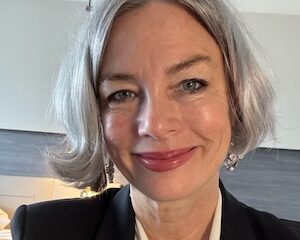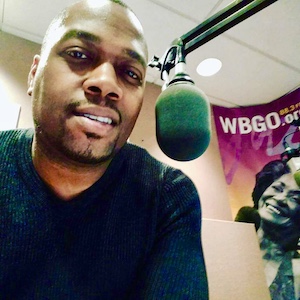How Ken Barcus transformed himself from a struggling schmuck into a mensch
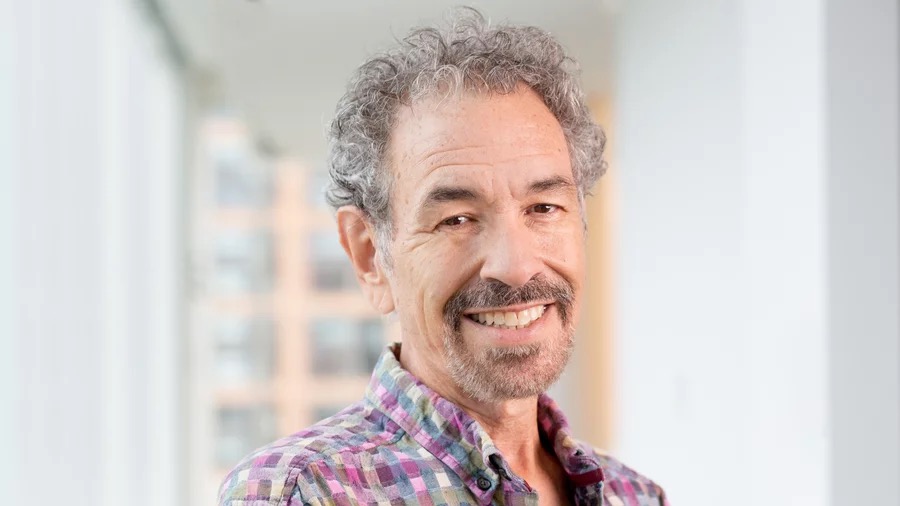
Allison Shelley / NPR
Ken Barcus
I am still learning from Ken Barcus, 67, my friend of 40 years, who died Oct. 11 from complications due to throat cancer in his hometown of Cleveland. He was hailed at his absolutely packed memorial service as “a giant.”
“Each of you in this room was a fabric in the thread that kept me going,” he said in a statement read by his wife Ellen at that service. “Much to my surprise, it is much easier living than dying. I could elaborate, but that would make me a lousy editor. All I’ve ever wanted to do was be a good person, a good friend, and a mensch. Thanks to each of you for moving me down that path.”
He received a four-minute remembrance on NPR’s Morning Edition the day he died — longer than many international leaders — and a lengthy obituary with wonderful pictures that truly captured his spirit and eccentric interests. “A tough editor with a big heart,” NPR’s Melissa Block wrote.
The tributes have also poured onto his Facebook page. So what else possibly needs to be said?
When I first met Ken in graduate school, I certainly did not see him as a giant in our class. In words he often used, he was just a “struggling schmuck” like the rest of us. Somehow in the intervening years, he did turn himself into a true mensch and a giant among his contemporaries. How did he do that?
He was, in his own words, “a whirling dervish of energy.” He had ideals, both in his professional and personal life, and he stuck to them. He didn’t let the limitations or projections that others placed upon him hold him back. He had a great, irreverent sense of humor and had no trouble laughing at himself. He worked hard and he played hard, diverting himself from a job that could be draining and all-consuming with passionate hobbies that reenergized him.
He never met a stranger, seeing nearly everyone he met as a potential friend, or certainly someone with an interesting story. He knew his mechanics, dry cleaners, and other service workers by name, including the proprietors of hole-in-the-wall fast-food joints. He viewed his entire social network — at work (even in far-flung bureaus), in his neighborhood, in the community — as a small town, and he wanted his friends to know each other, as he invited them (us) to go on dog-walking, hiking, cycling, paddling, or other adventures.
He knew how to make a dollar holler. Saturday morning yard sales were often followed, when I was his neighbor, by visits to junkyards where he’d search for car parts.
He presented himself as an eccentric who embarked on do-it-yourself and home improvement projects and often messed them up. That wasn’t really true. He bought a house for his daughter and rehabbed it over six weeks to the point where it looked great, at least in the Facebook photos.
Though he had a big job in national media, he didn’t have elite aspirations for himself. He had no interest in purchasing a McMansion in a gated community to insulate himself from the hoi polloi, though he probably could have afforded one in Cleveland.
He took pride in being one of the hoi polloi. He lived in the same neighborhood he grew up in. His daughters went to the same high school he went to, albeit 30+ years later. It had changed completely in demographics, from significantly Jewish to significantly Black and Hispanic, but that was fine with him. He saw people of all ethnicities as potential friends.
When he was accepted into a master’s degree journalism program at American University in Washington, D.C., in 1982, he was trying to decide what kind of journalism he wanted to specialize in. Broadcast, he decided. “You want to be one of those bubble-headed anchormen?” I quipped in one of our early exchanges, which tended to be sharp. “No,” he shot back. “I have a face for radio. I want to go into public radio.”
“Public radio?” I replied. “A nonprofit? You’ll never make more than $30,000 a year. You won’t be able to sustain yourself.” I assured him the future was in newspapers.
Ken, lucky for him, ignored my advice. In the early 1980s, before I and the rest of America were even listening, he saw enormous potential in public radio. He turned out to be more than right.
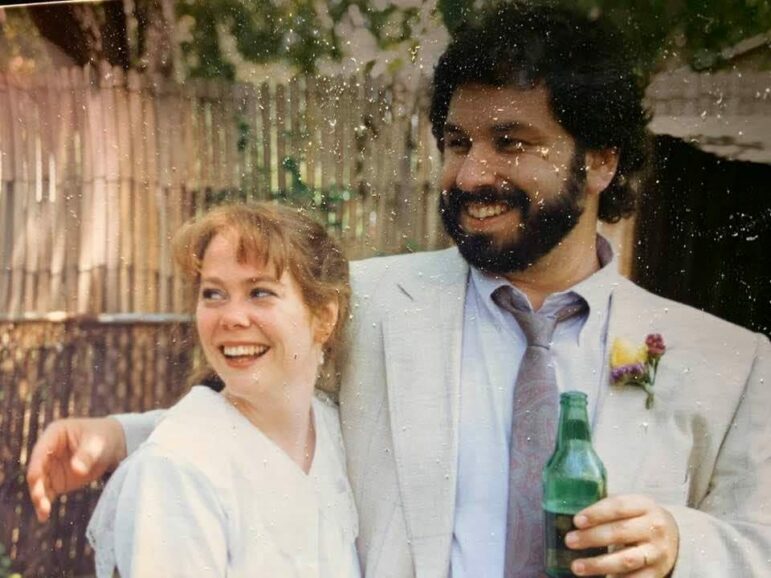
After graduation, he went to work for WAMU, the local NPR affiliate in D.C., and did some great local stories I would hear on my drive to work each morning. But as I predicted, public radio was not financially solid in those days. He and several other reporters were laid off when management decided to change formats.
I remember Ken complaining about his hyper-critical father who, even after Ken finished graduate school and his first professional job, wanted him to return home to Cleveland to take a job as a plumber or as a used car salesman. “Those are wonderful professions,” Ken’s nephew David pointed out at the memorial service. “But that isn’t what Ken wanted to be.”
Ken and I shared the experience of difficult fathers. When my father died, I had trouble coming to terms with his life and death. Ken made a point of asking for one of my father’s vintage Watling scales, which he kept in a corner of his dining room for more than 30 years. Now that’s a friend.
As noted in the NPR obituary, Ken made a historic difference at that national media organization. “It didn’t necessarily come naturally to him,” David said. He had to work hard at it. He called Ken a “self-made person.”
Ken wasn’t discouraged by his father’s well-intentioned if fumbling pigeonholing of his son.
He obtained freelance assignments from Christian Science Monitor Radio and was hired to work for them full-time. Thankfully, he left for NPR before it shut down in 1997.
About a year later, eager to move back to his hometown of Cleveland, where thanks to his mom he knew nearly everyone, he proposed to NPR that they let him open and staff a Midwest bureau for NPR. Slow to embrace the idea that Washington, D.C., wasn’t the center of the American news universe, the powers that be at NPR didn’t take his idea seriously.
So, during the dot-com boom of the late 1990s, he secured a job with Cleveland.com and left NPR. I was all for it. “The internet is the future of journalism,” I told him on one of the days that we worked out together at the Y. In retrospect, maybe not.
About a year later, he was really unhappy at the dot-com. He again approached the powers that be at NPR and they agreed to hire him back as Midwest Bureau Chief and put him in charge of building a solid team of reporters and editors across the Midwest, from Ohio to Louisiana to Iowa to Minnesota and the Dakotas. They gave him a Washington, D.C., salary with a Midwest cost of living, he said.
As an editor, he was essentially a teacher to hundreds of mostly highly motivated students — young public radio reporters. For years, he told me it was a very satisfying dream job.
He was Midwest Bureau Chief for 20 years. He told me when we last saw each other in August 2021 that he was really looking forward to retirement in a year, to spending more time gardening, raising chickens, managing properties, and tending to his many other hobbies. He said he was exhausted from the constant grind of editing 100 to 150 stories in an average week and frequently traveling around the Midwest.
In our last conversation in August, he told me he’d had to delay his retirement because he’d had COVID and pneumonia, and he feared that cancer had returned.
We talked about going kayaking in North Carolina once he retired and got better. “I’d really love that,” he said. Those were his last words to me.
Shortly thereafter, he had to cancel his big retirement party because he was so sick.
By September 2022, he knew that he was losing his battle, according to his former colleague Ken Rudin, as posted on Facebook. “These were not my retirement plans,” he quipped. “But you know the saying, ‘We plan, God laughs.’ Just a lousy roll of the dice.”
I was touched to learn from his memorial service that he had a hand in editing his own obituary. At least he knew at the end the esteem in which so many held him.
I’d say, given the awful circumstances, he had a pretty good death. And he crammed more life into his 67 years than most people do in 90 years.
How does one evolve from a schmuck into a mensch? Ken’s life offers some hints. He summoned the courage to face death before it happened. When he thought he might die — he survived cancer years before — he seemed to feel that every day of his final years was a gift not to be wasted. “I always tried to do more than what was expected,” his wife Ellen quoted him as saying in hospice.
He made a point of forgetting about his great deeds or minimizing them. When I reminded him in our last visit a year ago that he had stayed up with me nearly all night at the hospital when my infant son was ill, he shrugged and said he didn’t remember.
He didn’t think there was anything special about routinely bringing his many friends flowers and vegetables from his gardens nor the fact that he never met a stranger.
Ken and I sort of lost touch during the nine years I was living overseas. I didn’t pay much attention to his Facebook, and he didn’t pay much attention to mine. The other day, I went through years of his Facebook posts and pictures. What a funny guy he was.
What I was struck most by from reviewing his Facebook was how much like his mother he became. He wrote on Sept. 8, 2016:
My mother Evelyn (whom everyone called Evel), died peacefully at home yesterday at the age of 99. Like everyone’s mother, she was a remarkable woman. Years ago, I moved back to Cleveland because I wanted our (then) young girls to have at least five years growing up around her. They got nearly 20. She knew everybody in this town — I mean everybody. When I returned to Cleveland, I stopped being Ken Barcus. I became known again as “Evel’s son.”
My mother worked at her father’s clothing store as a young woman before marrying my father. They were married for 71 years, raising four children. I’m the baby. My mother was a homemaker — and so much more: an adventurer, a reader, a volunteer, a knitter, a lover of garage sales, and seemingly everyone’s best friend and helper. She loved clothes and fashion and made a point of ‘dressing up’ every day. She loved to write letters — sometimes crafting a dozen a day to friends all over the country. She wrote them all by hand with the most amazing penmanship you’ve ever seen. She was an irrepressible photographer, forcing everyone to pose for pictures at nearly every visit. And I do mean forcing.
… After my father died at 97, my mother started a second life, enriched by her many friends. When she outlived nearly all them, she made new younger ones. She was constantly in motion. She was so active, it was dizzying to watch her — going to events, concerts, shows, and luncheons, at a furious pace. Her friends would joke that she did more in a day than they did all week.
My wife, Ellen, said my mother’s motto should be, “why do it right if you can do it fast?” When I told my mother, she didn’t disagree.
When she was close to moving into an assisted living facility, she changed her mind at the last minute, declaring; “I can’t stand being around all those old people. They have nothing to talk about”, even though most were decades younger.
My mother, who said she didn’t feel loved by her mother, was all about unconditional love, constantly reminding everyone to hold their loved ones close, to visit shut-ins, to donate blood, to do things with their families, to remember and celebrate everyone’s birthday. Nobody left her house without a few pieces of her famous rugelach (look it up) or a bag of dried fruit, nuts and candy. Nobody. To her family and to her friends too numerous to count, she offered love, hilarious commentary sprinkled with malapropisms, and a joie de vivre that we try to imitate.
Judaism teaches that its sons and daughters should serve as examples to others.
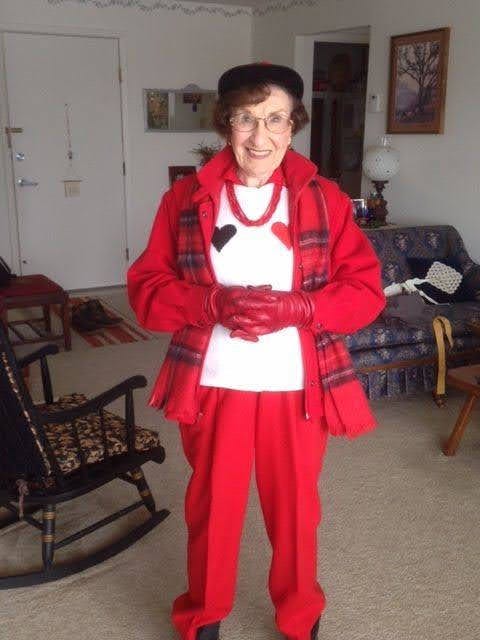
In their lives on this earth, both Ken Barcus and his mom Evel certainly did that. I like to think that now they are together.
Ken would no doubt be embarrassed by all this attention. I’d like to pick up the phone and tell him that his four-minute obit on NPR was preempted on WUNC, my local station, by the fall fundraising drive, so I missed it. I knew he would appreciate the quip, and would probably respond that WUNC had its priorities straight.
His daughter Julia posted to Facebook after his memorial service: “In the speech my dad wrote for my mom to read he said ‘the laughs, tears, and deep talks made up the framework of my life.’”
“Thanks for the blueprint, dad.”
Yep. Thanks for the blueprint, Ken. A true mensch. Certainly not a schmuck.
Jim Buie, a graduate of American University’s master’s degree program in journalism and public affairs, is a writer, editor, author, and teacher in North Carolina, after nine years in the Middle East. He publishes his newsletter “Slender Threads” about five times a week.


